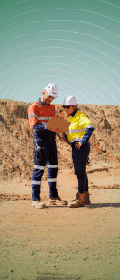Zyfra says it has developed an automated system using artificial intelligence (AI) to monitor the condition of excavator bucket teeth based on its machine vision BucketControl system.
The system is designed to detect the presence or absence of excavator bucket crowns quickly and features functions to alert the excavator operator if a crown is lost or ceases to work.
The application, developed jointly by the AI and Mining divisions of Zyfra, uses an on-board controller to acquire images from the camera, process and analyse them using internal software and sends a signal to the operator if a crown is lost or ceases to work. The wear of the tooth is also assessed, and when a critical value is reached, a notification is sent to the dispatcher, according to the company. This data is transmitted to the server in real time, Zyfra added.
Alexander Smolensky, Business Development Director of Zyfra, said: “With the help of machine vision, you can locate a broken tooth immediately and prevent it from getting into the crushing compartment, whose breakdown threatens the company with a loss of up to $200,000.”
He added: “When mining ore, a broken tooth may cause damage to the bucket, which would entail additional damage worth several million rubles. Our BucketControl system will ensure a cost reduction of 90% when finding a broken tooth.”
The automated system to monitor excavator bucket teeth has been further developed to look at fragmentation. This application measures continuously the size of the pieces of rock in the excavator bucket. “Correlating that size with the location coordinates yields a performance map of rock which measures the efficiency of rock blasting to balance the cost of blasting against the quarry output,” the company said.
Smolensky explained: “In contrast to images taken after the blast, the entire depth of exposed rock is analysed. That enables us to increase excavator productivity by up to 3%, minimises the chances of oversized pieces hitting the crushing compartment, makes it possible to track the quality of blasting operations and ultimately increase rock removal by up to 10%.
“Using the system to analyse previous blasting operations will also help determine the amount of explosives required for future blast works.”










